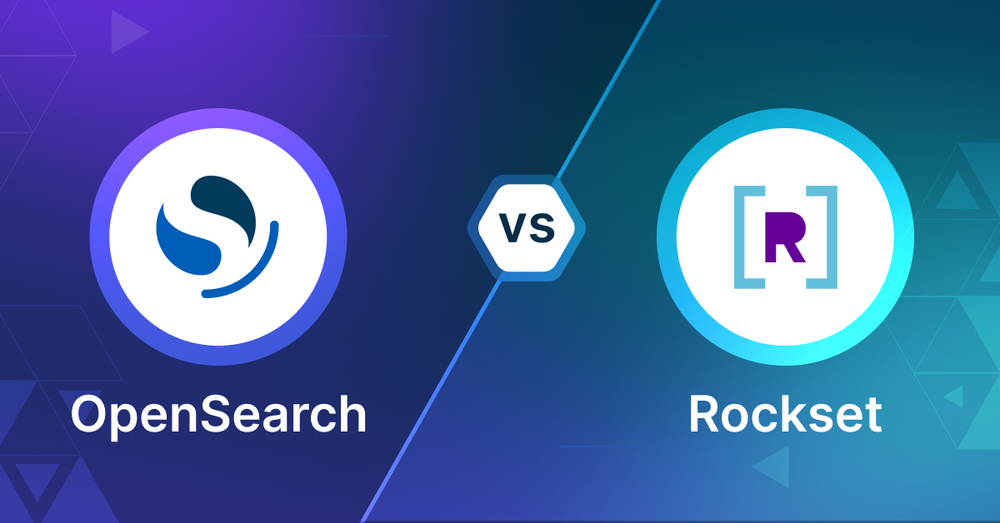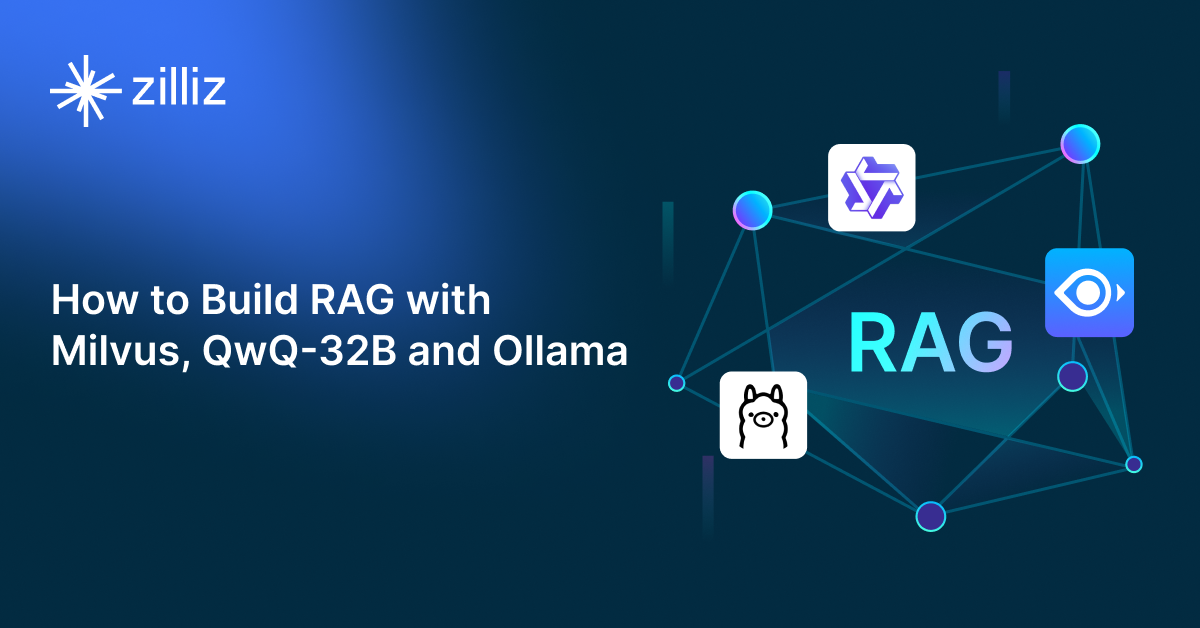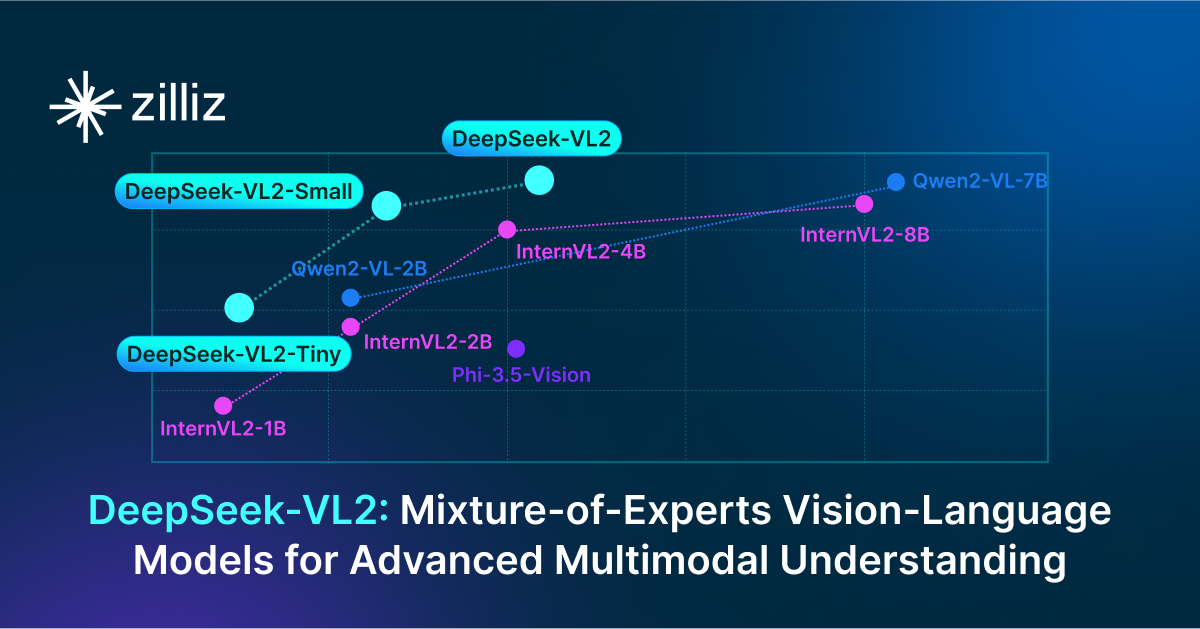OpenSearch vs Rockset: Selecting the Right Database for GenAI Applications

As AI-driven applications evolve, the importance of vector search capabilities in supporting these advancements cannot be overstated. This blog post will discuss two prominent databases with vector search capabilities: OpenSearch and Rockset. Each provides robust capabilities for handling vector search, an essential feature for applications such as recommendation engines, image retrieval, and semantic search. Our goal is to provide developers and engineers with a clear comparison, aiding in the decision of which database best aligns with their specific requirements.
What is a Vector Database?
Before we compare OpenSearch and Rockset, let's first explore the concept of vector databases.
A vector database is specifically designed to store and query high-dimensional vectors, which are numerical representations of unstructured data. These vectors encode complex information, such as the semantic meaning of text, the visual features of images, or product attributes. By enabling efficient similarity searches, vector databases play a pivotal role in AI applications, allowing for more advanced data analysis and retrieval.
Common use cases for vector databases include e-commerce product recommendations, content discovery platforms, anomaly detection in cybersecurity, medical image analysis, and natural language processing (NLP) tasks. They also play a crucial role in Retrieval Augmented Generation (RAG), a technique that enhances the performance of large language models (LLMs) by providing external knowledge to reduce issues like AI hallucinations.
There are many types of vector databases available in the market, including:
- Purpose-built vector databases such as Milvus, Zilliz Cloud (fully managed Milvus)
- Vector search libraries such as Faiss and Annoy.
- Lightweight vector databases such as Chroma and Milvus Lite.
- Traditional databases with vector search add-ons capable of performing small-scale vector searches.
OpenSearch is an open source search and analytics suite with vector search as an add-on; Rockset is a real-time search and analytics database with vector search as an add-on.
What is OpenSearch? An Overview
OpenSearch is a robust, open-source search and analytics suite that manages a diverse array of data types, from structured, semi-structured, to unstructured data. Launched in 2021 as a community-driven fork from Elasticsearch and Kibana, this OpenSearch suite includes the OpenSearch data store and search engine, OpenSearch Dashboards for advanced data visualization, and Data Prepper for efficient server-side data collection.
Built on the solid foundation of Apache Lucene, OpenSearch enables highly scalable and efficient full-text searches (keyword search), making it ideal for handling large datasets. With its latest releases, OpenSearch has significantly expanded its search capabilities to include vector search through additional plugins, which is essential for building AI-driven applications. OpenSearch now supports an array of machine learning-powered search methods, including traditional lexical searches, k-nearest neighbors (k-NN), semantic search, multimodal search, neural sparse search, and hybrid search models. These enhancements integrate neural models directly into the search framework, allowing for on-the-fly embedding generation and search at the point of data ingestion. This integration not only streamlines processes but also markedly improves search relevance and efficiency.
Recent updates have further advanced OpenSearch's functionality, introducing features such as disk-optimized vector search, binary quantization, and byte vector encoding in k-NN searches. These additions, along with improvements in machine learning task processing and search query performance, reaffirm OpenSearch as a cutting-edge tool for developers and enterprises aiming to fully leverage their data. Supported by a dynamic and collaborative community, OpenSearch continues to evolve, offering a comprehensive, scalable, and adaptable search and analytics platform that stands out as a top choice for developers needing advanced search capabilities in their applications.
Rockset: Overview and Core Technology
Rockset is a real-time search and analytics database for structured and unstructured data, including vector embeddings. Its sweet spot is ingesting, indexing and querying data in real-time so it’s great for applications that need up-to-the-second insights. Rockset supports both streaming and bulk data ingestion, can process high velocity event streams and change data capture (CDC) feeds in 1-2 seconds.
One of Rockset’s key features is Converged Indexing built on mutable RocksDB. This allows for in-place updates of vectors and metadata so it’s super efficient for scenarios where data changes frequently. Rockset can handle documents up to 40MB and supports vector dimensionality up to 200,000 so it’s good for a wide range of vector embedding use cases.
Rockset has vector search built into the core. It supports K-Nearest Neighbors (KNN) and Approximate Nearest Neighbors (ANN) search methods and uses a distributed FAISS index for scalability. Rockset is algorithm agnostic, so you can choose your own search implementation. The cost-based optimizer can dynamically choose between KNN and ANN search methods for optimal performance.
What’s unique about Rockset for vector search is the Converged Index which combines search, ANN, columnar and row indexes into one. This means you can handle a wide range of query patterns out of the box. Rockset also supports metadata filtering and hybrid search. The optimizer will choose the most efficient query path. Can search across multiple ANN fields, supports multi-modal models and has both SQL and REST APIs for query interface.
Comparing OpenSearch and Rockset: Key Differences for GenAI
Search Methodology
OpenSearch has significantly advanced its search capabilities, integrating Apache Lucene with powerful vector search functionalities. It now supports a range of machine learning-powered search methods including k-NN, semantic search, and hybrid models. This integration allows for sophisticated, AI-driven applications with on-the-fly embedding generation and enhanced search efficiency, suitable for handling diverse and large datasets.
Rockset focuses on real-time search and analytics with an emphasis on handling high velocity data streams and change data capture feeds. It incorporates advanced indexing and querying techniques such as Converged Indexing and supports both KNN and ANN searches, using a distributed FAISS index for vector search. This makes it exceptionally adept at delivering up-to-the-second insights for real-time applications.
Data Handling
OpenSearch effectively manages structured, semi-structured, and unstructured data, offering extensive data processing capabilities that are continually enhanced with features like disk-optimized vector search and binary quantization. These features allow it to handle complex data scenarios and large data volumes efficiently.
Rockset is designed to handle both structured and unstructured data, including vector embeddings. It excels in scenarios where data changes frequently, thanks to its mutable RocksDB-based Converged Indexing, which allows in-place updates of vectors and metadata. This capability supports a wide range of vector embedding use cases, including documents up to 40MB and vector dimensionality up to 200,000.
Scalability and Performance
OpenSearch is highly scalable, designed to handle large datasets across distributed environments. Its latest enhancements in vector search and machine learning task processing further improve its performance for complex queries and large data volumes.
Rockset offers real-time scalability and is built to efficiently manage high data velocity through its innovative indexing and querying infrastructure. Its ability to dynamically choose between search methodologies based on performance optimization makes it highly scalable and efficient for real-time analytics.
Flexibility and Customization
OpenSearch provides extensive customization options through its plugins and open-source nature, allowing developers to tailor the system extensively to fit their specific requirements.
Rockset also offers significant flexibility, especially in real-time data operations. It supports multiple vector fields and hybrid search capabilities, and its cost-based optimizer enhances query performance by intelligently selecting the most efficient query paths.
Integration and Ecosystem
OpenSearch benefits from a broad and supportive community, integrating well with various tools and platforms, especially those designed for data visualization and log analysis.
Rockset integrates seamlessly with various data sources for both streaming and bulk data ingestion. Its SQL and REST APIs facilitate easy integration with other systems, making it compatible with a wide range of applications and workflows.
Ease of Use
OpenSearch continues to evolve, supported by comprehensive documentation and a community that aids in reducing its learning curve, despite its sophisticated capabilities.
Rockset emphasizes ease of use in real-time data scenarios, supported by detailed documentation and developer-friendly features like a Python SDK, which simplifies integration and use in AI-driven applications.
Cost Considerations
OpenSearch can be cost-effective for self-managed deployments but may incur higher costs in larger, cloud-based deployments due to its extensive functionality.
Rockset, being fully managed, generally involves higher operational costs but offers significant savings in management overhead and time to deployment, especially in real-time analytics scenarios.
Security Features
OpenSearch includes robust security measures such as encryption, role-based access control, and audit trails, suitable for securing sensitive data and ensuring compliance.
Rockset also incorporates strong security practices, although specifics like encryption and access control weren't detailed, it likely adheres to industry standards to ensure data security in its real-time analytics environment.
When to choose OpenSearch and Rockset for GenAI
Deciding when to choose OpenSearch versus Rockset depends largely on your specific needs, particularly concerning the nature of your data, the real-time requirements of your applications, and the complexity of your search and query needs.
Choose OpenSearch for GenAI when:
- Complex Search Needs: You require sophisticated search capabilities across various data types, including full-text, semantic, vector, and hybrid searches. OpenSearch is ideal for applications that demand complex querying and extensive search functionalities embedded within large datasets.
- Diverse Data Management: Your system needs to handle structured, semi-structured, and unstructured data within a single platform. OpenSearch’s flexibility makes it suitable for environments where varied data ingestion and processing are critical.
- Scalability with Customization: You are looking for a solution that offers both horizontal scalability and extensive customization options through plugins and community contributions. OpenSearch is well-suited for organizations that want to tailor their search and analytics engine to specific use cases or integrate it deeply with existing systems.
- Advanced Data Visualization: You need integrated analytics and data visualization tools for in-depth data exploration and real-time insights. OpenSearch Dashboards provide a powerful interface for visualizing and interacting with data.
Choose Rockset for GenAI when:
- Real-Time Analytics Requirements: Your application demands ultra-fast data ingestion and querying capabilities for real-time analytics. Rockset is optimized for scenarios that require immediate insights from streaming data, change data capture feeds, or rapid query responses.
- Efficient Handling of High-Velocity Data: You deal with high-velocity event streams or require a system that can process and index data almost instantaneously. Rockset's real-time indexing and its ability to handle frequent data updates make it highly effective for dynamic data environments.
- Hybrid Querying Needs: You require a system that can perform complex hybrid searches combining vector and traditional data filtering. Rockset’s converged indexing and sophisticated query optimizer are tailored for applications that blend vector search with SQL querying, providing flexibility and efficiency.
- Cloud-Native Scalability: You prefer a fully managed, cloud-native solution that scales automatically without significant operational overhead. Rockset’s architecture is designed to dynamically scale in cloud environments, making it ideal for businesses that need to scale quickly based on demand.
Using Open-source VectorDBBench to Evaluate and Compare Vector Databases on Your Own
VectorDBBench is an open-source benchmarking tool designed for users who require high-performance data storage and retrieval systems, particularly vector databases. This tool allows users to test and compare the performance of different vector database systems such as Milvus and Zilliz Cloud (the managed Milvus) using their own datasets, and determine the most suitable one for their use cases. Using VectorDBBench, users can make informed decisions based on the actual vector database performance rather than relying on marketing claims or anecdotal evidence.
VectorDBBench is written in Python and licensed under the MIT open-source license, meaning anyone can freely use, modify, and distribute it. The tool is actively maintained by a community of developers committed to improving its features and performance.
Download VectorDBBench from its GitHub repository to reproduce our benchmark results or obtain performance results on your own datasets.
Take a quick look at the performance of mainstream vector databases on the VectorDBBench Leaderboard.
Read the following blogs to learn more about vector database evaluation.
Further Resources about VectorDB, GenAI, and ML
- What is a Vector Database?
- What is OpenSearch? An Overview
- Rockset: Overview and Core Technology
- Comparing OpenSearch and Rockset: Key Differences for GenAI
- When to choose OpenSearch and Rockset for GenAI
- Using Open-source VectorDBBench to Evaluate and Compare Vector Databases on Your Own
- Further Resources about VectorDB, GenAI, and ML
Content
Start Free, Scale Easily
Try the fully-managed vector database built for your GenAI applications.
Try Zilliz Cloud for FreeKeep Reading
Milvus/Zilliz + Surveillance: How Vector Databases Transform Multi-Camera Tracking
See how Milvus vector database enhances multi-camera tracking with similarity-based matching for better surveillance in retail, warehouses and transport hubs.

How to Build RAG with Milvus, QwQ-32B and Ollama
Hands-on tutorial on how to create a streamlined, powerful RAG pipeline that balances efficiency, accuracy, and scalability using the QwQ-32B model and Milvus.

DeepSeek-VL2: Mixture-of-Experts Vision-Language Models for Advanced Multimodal Understanding
Explore DeepSeek-VL2, the open-source MoE vision-language model. Discover its architecture, efficient training pipeline, and top-tier performance.
The Definitive Guide to Choosing a Vector Database
Overwhelmed by all the options? Learn key features to look for & how to evaluate with your own data. Choose with confidence.